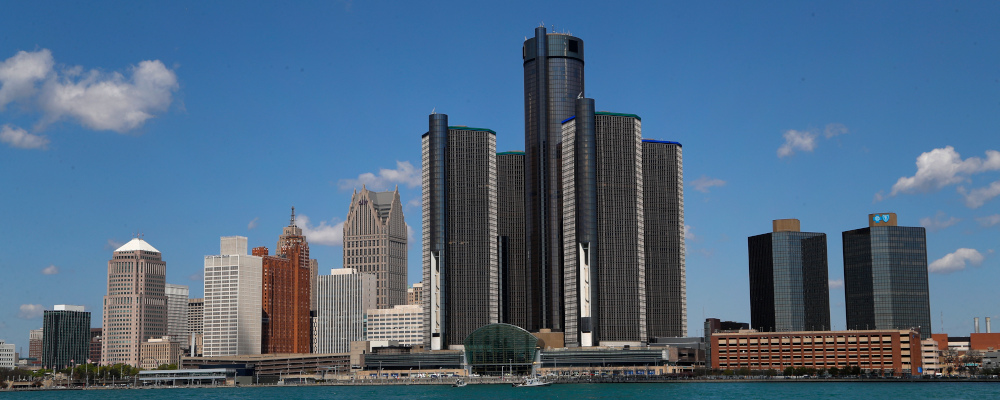I’m sitting in an old hotel lounge in Detroit. Its best days are behind it, but so are its worst. Beneath the new paint and furnishings, you can see the toll time and neglect have taken. In some ways, it adds to the charm. The place has stories to tell.
Detroit is a stark contrast with Toronto. Toronto is dealing with the problems of success. We’ve struggled to keep up with the number of people who want to move here. Detroit is dealing with the problems of long-term decline. They have to try hard to attract people. Michigan and Ontario also contrast, but maybe not how you’d expect. We’ll get to that later.
Detroit is the poster child for urban decline in North America. Detroit was the birthplace of the automobile and a prototype for a modern, car-centric metropolis. That model failed as the automobile allowed people to move out of the city altogether. The tax base collapsed, and maintaining the city’s services and infrastructure became increasingly difficult.
During the 2000s the local government decided that the city needed to “shrink” since it was too expensive to service. So it began knocking down some derelict neighbourhoods while auctioning vacant homes in hopes of attracting more ratepayers. This was too little, too late. The City went bankrupt in 2013.
Things have been looking up for Detroit since it went bust. If you arrive expecting Downtown to be dodgy, you’re going to be shocked. Most Downtown hotels go for over $300 now. It’s packed with tourists coming in for concerts and ballgames. It doesn’t look like anything out of an Eminem song. Of course, many parts of the sprawling city are still undeniably struggling. But a healthy downtown gives the city a ballast. It’s a reason to come to the city and spend money. It also means that businesses can operate in the city with confidence, knowing they’ll be able to attract employees who feel comfortable going to a downtown office in the not-so-long-ago derelict city.
Progress is palpable. You don’t have to talk to many people before you realize there’s some optimism about the state of the city.
The last time I was in Detroit I met a 30-something audio technician. He’d moved to Midtown from Buffalo a few years ago. I asked him why, and his answer was simple: it’s a bigger market, so there are more opportunities for someone working in a niche industry.
Detroit is in some respects a testament to the resilience of cities. Detroit faces all kinds of challenges —financial, logistical, reputational. Yet, people still move here.
It’s helpful to think about cities as labour markets to understand why Detroit is still standing. Having a large number of people together in one place means there are a lot of prospective employees, and a lot of jobs. Urban labour markets are good at matching people to jobs. Circling back to the audio technician I met, he had some opportunities in Buffalo. He just had more in Detroit, which is more than twice as big. More workers means more customers.
What may surprise you is that despite all of Detroit’s challenges, Michigan is a wealthier jurisdiction than Ontario. It seems weird that a state whose major city is known for urban blight would be more prosperous than a province with a major global city like Toronto. Yet, as University of Calgary economist Trevor Tombe recently pointed out in these pages, Michigan’s per capita GDP was around $7000 higher than Ontario’s in 2022.
Ontario isn’t just lagging behind Michigan, but most American states. Our GDP per capita is just ahead of Alabama, which is in the bottom ten states and provinces (ahead of five provinces—also alarming).
There are a lot of lessons we could learn from Detroit and Michigan as a whole. But things we should and should not do. My purpose here is more of a benchmarking exercise.
The reason we’re lagging is both simple and complex: productivity. Canada’s productivity has lagged behind the United States for decades. But why and what to do about it are much more complicated questions. Questions we need answers to—fast.

Michigan is a state we associate with poverty, decline, and bad sports teams (notwithstanding the fact that I saw the Tigers pitch a no-hitter against the Blue Jays last week). Yet, they’re eating our lunch. This should alarm Ontarians.
Toronto is on the cusp of becoming a world-class city (though it has a lot of work to do). But a lot of the province has been left behind. While Toronto and many GTA adjacent municipalities (as well as Ottawa) have done relatively well, large swaths of Northern, Eastern, and Southwestern Ontario have not.
Michigan also has regional challenges. We’ve all heard of Michael Moore’s hometown Flint, for instance. But cities like Grand Rapids and Ann Arbour are doing very well. If Ontario wants to catch up with Michigan, let alone wealthier Great Lakes states like Pennsylvania or Minnesota, we need prosperity to expand beyond a loose ring around Toronto and Ottawa. Toronto outshining Detroit isn’t enough.
While Detroit itself may not be thriving, it’s still standing. When you look past the patchy roads and underused surface parking lots, you see the artifacts of a great city, yearning to be great again. It’s an underdog story if there ever was one. Detroit vs Everybody.
Yet, with its largest city on the ropes, Michigan is running ahead of Ontario. Maybe despite appearances, we’re the underdogs in this story. We should act like it.
Recommended for You

‘There are consequences to this legislation’: Michael Geist on why the Canada-U.S. digital services tax dustup was a long time coming

Rudyard Griffiths and Sean Speer: The future of news in Canada: A call for rethinking public subsidies

‘You have to meet bullying with counter-bullying’: David Frum on how Canada can push back against Trump’s trade negotiation tactics

Need to Know: Mark Carney’s digital services tax disaster



